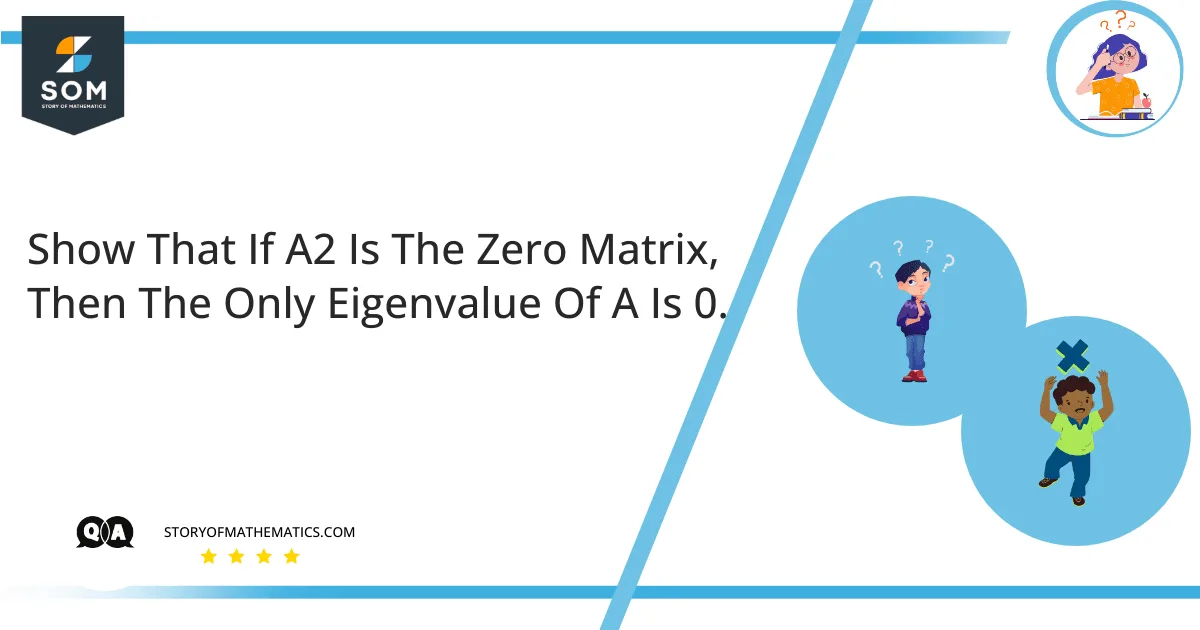
The aim of this question is to prove the statement for only the eigenvalue of $A$ to be zero.
The concept behind this question is the knowledge of eigenspace and eigenvalue.
Expert Answer
Suppose that a non-zero value $\lambda $ is an eigenvalue of the vector $A$ and the corresponding eigenvector = $\vec{ x }$.
As given in the question statement, we have:
\[ A^2=0\]
We can write that:
\[ \vec{ 0} =\ \left[ \begin{matrix} 0 & 0\\0 & 0\\ \end{matrix} \right]\ \vec{x} \]
\[ \vec{ 0} = A^2 \vec{x} \]
\[ \vec{ 0} = A \lambda \vec{x} \]
\[ \vec{ 0} = \lambda^2 \vec{x} \]
This is proved as:
Let us suppose a vector $ v$ such that it is a non-zero vector and fulfills the following condition:
\[ A \times v = \lambda v \]
Thus we can write that:
\[ = A^2 \times v \]
\[ = A \times \left( A \times v \right) \]
\[ = A \left( \lambda v \right) \]
\[ = \lambda \left( A \times v \right) \]
\[ =\lambda^{2 } v ≠0 \]
And therefore we can say that $ A^2 ≠ 0$
As $\vec{x} ≠ \vec{0}$ , this concludes that $\lambda^2$ = 0 and therefore the only possible eigenvalue is $\lambda = 0$.
Otherwise then $ A $ would be invertible, and so would $A^2 $ since it is the product of invertible matrices.
Numerical Results
\[ A \times v = \lambda v \]
Thus, we can write:
\[ = A^2 \times v \]
\[ = A \times \left( A \times v \right) \]
\[ = A \left( \lambda v \right) \]
\[ = \lambda \left( A \times v \right) \]
\[ =\lambda^{2 } v ≠0 \]
And therefore, we can say that $ A^2 ≠ 0$
Example
Find the basis for the given eigenspace, corresponding to the given eigenvalue:
\[ A =\ \left[ \begin{matrix} 4 & 1\\3 & 6\\ \end{matrix} \right]\ ,\lambda=3 , \lambda = 7 \]
For given $\lambda = 3$ will be equal to $ A -\ 3I$
This will be:
\[ \left[ \begin{matrix} 1 & 1\\3 & 3\\ \end{matrix} \right]\ \sim \left[ \begin{matrix} 1 & 1\\0 & 0\\ \end{matrix} \right]\ \]
So the basis for the given eigenspace, corresponding to the given eigenvalue $\lambda = 3$ is:
\[ = \left[\begin{matrix} 1 \\ -1 \\ \end{matrix} \right] \]
For given $\lambda = 7 $ will be equal to $ A -\ 7 I $
This will be:
\[ \left[ \begin{matrix} -3 & 1\\3 & -1\\ \end{matrix} \right]\ \sim \left[ \begin{matrix} -3 & 1\\0 & 0\\ \end{matrix} \right]\ \]
So the basis for the given eigenspace, corresponding to the given eigenvalue $\lambda = 7 $ is:
\[ = \left[\begin{matrix} 1 \\ 3 \\ \end{matrix} \right] \]
So the basis for the given eigenspace, corresponding to the given eigenvalue $\lambda = 3$ and $\lambda = 7$ are:
\[Span = \left[\begin{matrix} 1 \\ -1 \\ \end{matrix} \right] \]
\[ Span = \left[\begin{matrix} 1 \\ 3 \\ \end{matrix} \right] \]
